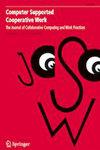HeteFed: Heterogeneous Federated Learning with Privacy-Preserving Binary Low-Rank Matrix Decomposition Method
IF 2.3
3区 计算机科学
Q3 COMPUTER SCIENCE, INTERDISCIPLINARY APPLICATIONS
Computer Supported Cooperative Work-The Journal of Collaborative Computing
Pub Date : 2023-05-24
DOI:10.1109/CSCWD57460.2023.10152714
引用次数: 0
Abstract
Federated learning is a machine learning paradigm where many clients collaboratively train a machine learning model while ensuring the nondisclosure of local data sets. Existing federated learning methods conduct optimization over the same model structure, which ensures the convenience of parameter updates. However, the same structure among clients and the server may pose risks of privacy leakage as parameters from one’s model can fit in others’ models. In this paper, we propose a heterogeneous federated learning method to preserve privacy. Each client utilizes neural architecture search to determine distinct models via local data and update the server model via a federated learning framework with knowledge distillation. Besides, we develop a privacy-preserving binary low-rank matrix decomposition method (Blow), i.e., decomposing the output matrix into two low-rank binary matrices, to further ensure the secrecy of distilled information. A simple but efficient alternating optimization method is proposed to address a key subproblem arising from the binary low-rank matrix decomposition, which falls into the category of the Np-hard bipartite boolean quadratic programming. Based on extensive experiments over the image classification task, we show our algorithm provides satisfactory accuracy and outperforms baseline algorithms in both privacy protection and communication efficiency.基于隐私保护的二值低秩矩阵分解方法的异构联邦学习
联邦学习是一种机器学习范例,其中许多客户端协作训练机器学习模型,同时确保不公开本地数据集。现有的联邦学习方法在相同的模型结构上进行优化,保证了参数更新的便捷性。然而,客户机和服务器之间的相同结构可能会带来隐私泄露的风险,因为一个模型中的参数可以适合其他模型。在本文中,我们提出了一种异构联邦学习方法来保护隐私。每个客户端利用神经架构搜索通过本地数据确定不同的模型,并通过具有知识蒸馏的联邦学习框架更新服务器模型。此外,我们开发了一种保持隐私的二值低秩矩阵分解方法(Blow),即将输出矩阵分解为两个低秩二值矩阵,进一步保证了提取信息的保密性。针对二元低秩矩阵分解中的一个关键子问题,提出了一种简单有效的交替优化方法,该方法属于Np-hard二部布尔二次规划。基于对图像分类任务的大量实验,我们表明我们的算法具有令人满意的准确性,并且在隐私保护和通信效率方面优于基线算法。
本文章由计算机程序翻译,如有差异,请以英文原文为准。
求助全文
约1分钟内获得全文
求助全文
来源期刊

Computer Supported Cooperative Work-The Journal of Collaborative Computing
COMPUTER SCIENCE, INTERDISCIPLINARY APPLICATIONS-
CiteScore
6.40
自引率
4.20%
发文量
31
审稿时长
>12 weeks
期刊介绍:
Computer Supported Cooperative Work (CSCW): The Journal of Collaborative Computing and Work Practices is devoted to innovative research in computer-supported cooperative work (CSCW). It provides an interdisciplinary and international forum for the debate and exchange of ideas concerning theoretical, practical, technical, and social issues in CSCW.
The CSCW Journal arose in response to the growing interest in the design, implementation and use of technical systems (including computing, information, and communications technologies) which support people working cooperatively, and its scope remains to encompass the multifarious aspects of research within CSCW and related areas.
The CSCW Journal focuses on research oriented towards the development of collaborative computing technologies on the basis of studies of actual cooperative work practices (where ‘work’ is used in the wider sense). That is, it welcomes in particular submissions that (a) report on findings from ethnographic or similar kinds of in-depth fieldwork of work practices with a view to their technological implications, (b) report on empirical evaluations of the use of extant or novel technical solutions under real-world conditions, and/or (c) develop technical or conceptual frameworks for practice-oriented computing research based on previous fieldwork and evaluations.
 求助内容:
求助内容: 应助结果提醒方式:
应助结果提醒方式:


